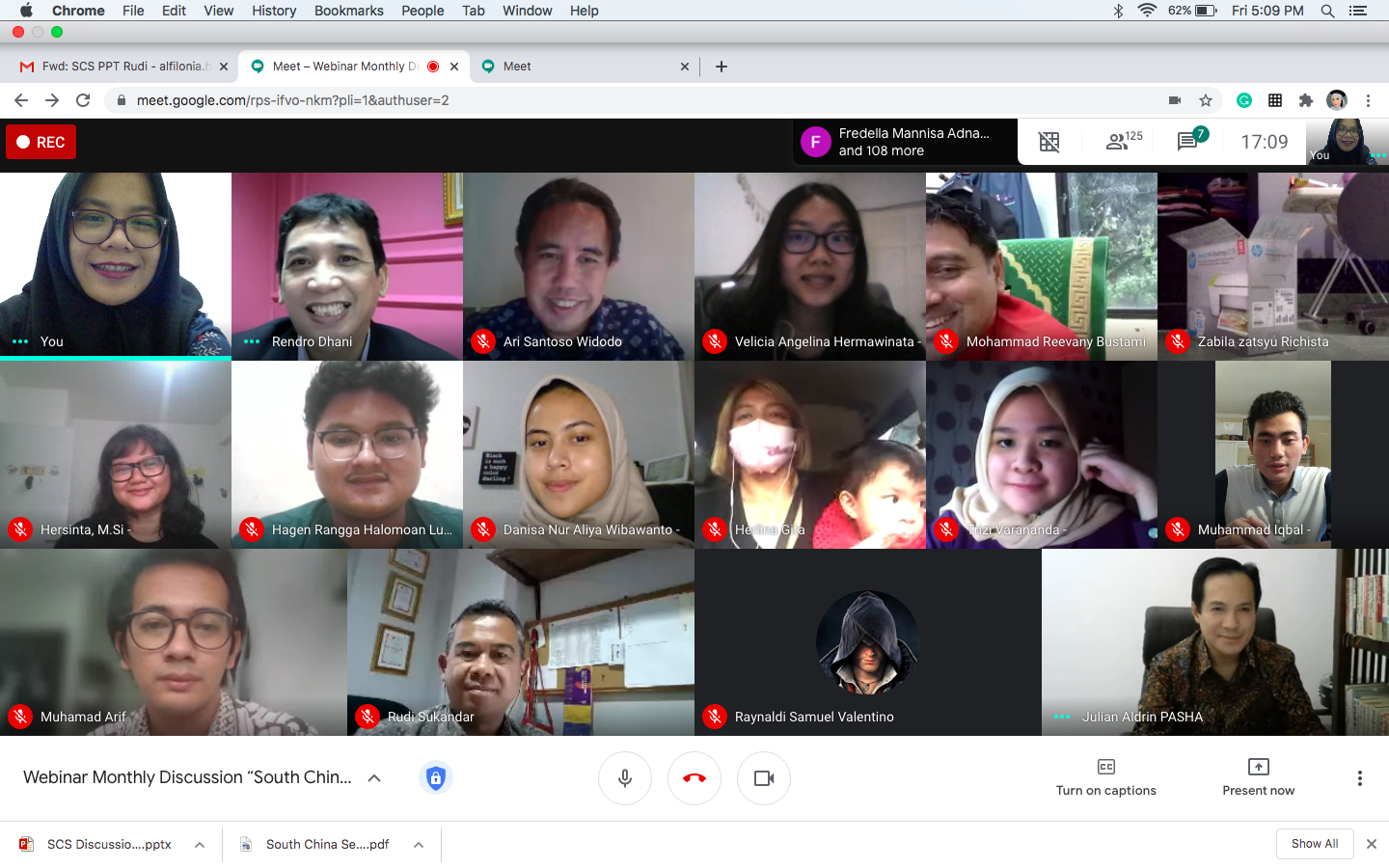On September 25, the LSPR Research Center held a Webinar entitled South China Sea: A multi dimensional discussion. The speakers were Dr. Yan Yan, Director of the Research Center of Oceans Law and Policy in the National Institute for the South China Sea Studies (NISCSS) of China; Julian Aldrin Pasha, Ph.D, Head of Political Science Department from University of Indonesia; Prof. Reevany Bustami, Head Nusantara-Malay Archipelago Research at the Centre Policy and International Studies, Universiti Sains Malaysia (USM) Malaysia; Muhammad Arif, Researcher of ASEAN Studies Program, the Habibie Center; Rudi Sukandar, Ph.D, Director of LSPR Center for Research, Publication, and Community Service, Ari S. Widodo, Ph. D, Program Director of E-Learning Program of LSPR; and this event was hosted by Research Centre LSPR and was moderated by Rendro Dhani, Ph.D, the Head of LSPR Research Center.
The first speaker, Dr. Yan Yan discussed the issue of the South China Sea during the pandemic in 2020. She underlined that there is a need to increase relations among countries which related to various issues in the South China Sea. In 2020, all activities will stop temporarily and there is a need to communicate via online platforms. This year’s problem is the platform through the group meeting, there is no more face-to-face communication that is concerned with the South China Sea and hopes to be stable for today and in the future.
The next speaker, Dr. Pasha discussed contemporary issues related to the South China Sea dispute by linking Morgenthau’s theory of balance of power and the role of super power states in the context of politics, military and economy. Dr. Pasha also underlined the role of global powers, the U.S. and China, which can balance the power in the disputed territory. Finally, Dr. Pasha warned the audience that the South China Sea has the potential to become an arena of war between America and China.

Live in Youtube LSPR-Jakarta.
The third speaker, Prof. Bustami discussed the South China Sea dispute by relating it to the concept of the Nusantara Maritime Paradigm. He said that according to the archipelago’s perspective based on the sociological perspective of Sumpah Palapa from Gajah Mada of Majapahit Kingdom, the disputed areas that occurred in the South China Sea historically belong to the ASEAN countries, including Malaysia, Singapore, Philippines, and Indonesia. He, among others, puts forward the facts based on Sundaland concept. In addition, he also explained about the Nusantara Maritime Paradigm: Antara-Nusa Mediterranean which is the Malayo Archipelago, a social-Economic Habitat Migrant, Maritime Society, relations with water, and tanah airku.

Prof. Bustami discussed the South China Sea dispute by relating it to the concept of the Nusantara Maritime Paradigm.
The fourth speaker, Dr. Rudi Sukandar, discussed the issue of the South China Sea in several case studies as presented in media report, including the dispute among claimants of South China Sea and between conflict between China and the U.S. Dr. Sukandar mentioned competing narratives developed in the media, for examples the existence of fiery and support-giving rhetorics. The speaker also mentioned ambiguous and inconsistent rhetorics which resulted in mixed messages sent by the conflicting parties and served each party’s strategic ambiguity regarding the issue.

Dr. Rudi Sukandar, discussed the issue of the South China Sea in several case studies as presented in media report.
The next speaker, Muhammad Arif, focused on security developments in the South China Sea. He noted on his presentation about the current and key building in the South China Sea and Indonesia’s relationship with the South China Sea.

Mr. Muhammad Arif focused on security developments in the South China Sea.
Finally, Dr. Ari Widodo discussed his presentation on the South China Sea from a media scholar perspective, which is various issues emerging and relating to the South China Sea from the twentieth countries. He noted that globally South China Seas is presented with the same view of conflict based on a sociological perspective.

Dr. Ari Widodo discussed his presentation on the South China Sea from a media scholar perspective.

